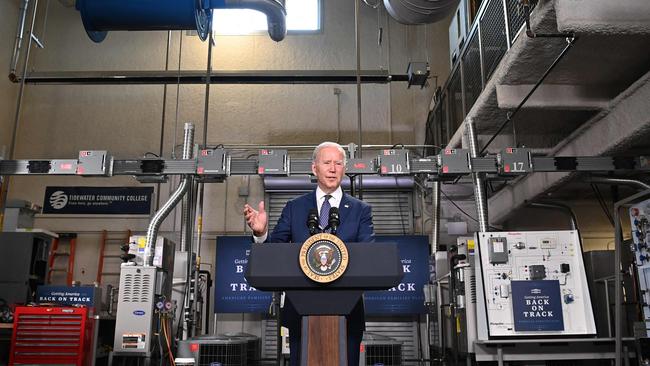Progress of Biden’s union act is being closely watched
If Labor does win the next election, the union movement will be ready with their desired reforms, put together with aspects of the US system in mind.

“The American Jobs Plan is a blue-collar blueprint to build America, that’s what it says. And, it recognises something I’ve always said. The guys and women on Wall Street, Wall Street didn’t build this country. The middle class built this country. And unions build the middle class …”
This is the President of the United States, during his first address before a joint session of Congress last week. He spoke in support of a controversial new pro-union bill, which would make significant and sweeping changes to American workplaces.
The bill passed the House in March, but is currently before the Senate. Joe Biden called on them to pass the Protect the Right to Organise Act (PRO Act) “and send it to my desk to support the right to unionise … by the way, while you’re thinking about sending things to my desk, let’s raise minimum wage to $15”.
“No one, no one working 40 hours a week should live below the poverty line,” the president added.
Just days earlier, Biden put in place a plan B; he signed an executive order establishing a new White House Task Force. Last week I focused on the task force, which is designed to find other ways of implementing the outcomes the legislation is designed to achieve, and has the specific goal of increasing union membership in America.
Both the task force and the PRO Act are relevant to us, because our federal government may change at the next election, and many Australian unions regard the American workplace relations system as the ideal.
If Labor does win the next election, the union movement will be ready with their desired reforms, put together with aspects of the US system in mind.
In particular, current US federal law provides for compulsory membership of unions, or compulsory fee paying to unions, where unions have been voted onsite by a majority of the employees. The PRO Act takes this issue even further, and specifically prevents any states from operating or enacting legislation to invalidate the implementation of compulsory union membership.
The PRO Act bans “Union-Avoidance Meetings” or “captive audience meetings” within businesses. These are meetings where the employer pays workers to attend, so they can have discussions about whether unionising the business is a good idea or not, according to the employer, who may want to make their case against unionisation, before the employees vote.
Australian unions have long admired the compulsory membership aspect of the US system, as it is simply more efficient for them. Bargaining with employers takes a certain amount of effort, and they would rather that the entire workforce is paying them to do it, instead of say, only 30 per cent. And banning employers from talking to employees about options other than unionisation would be highly desired, too.
Union officials here in the past have spoken out about “freeloaders”, which is how workers who don’t want to join unions are referred to. Unions say it isn’t fair that these employees get the benefit of a pay rise and representation, without paying for it.
Of course, this ignores the fact these workers didn’t ask for the representation, and would have probably been given a pay rise, if not exactly the same one, regardless of union involvement.
Another aspect of the PRO Act that Australian unions may push for is the virtual wipe-out of the independent contractor class.
The act defines a person as an “employee” (and not an independent contractor) unless (1) the individual is free from control and direction in connection with the performance of the service (both under contract and in fact), (2) the service is performed outside the usual course of the employer’s business, and (3) the individual is customarily engaged in an independently established trade, occupation, profession, or business of the same nature as that involved in the service performed.
Ken Phillips, executive director of Self Employed Australia, is keeping an eye on the Biden reforms. “For the land of the free and entrepreneurship this is an extraordinary attack directed from ‘within’,” he says, and “the Biden proposal to effectively outlaw self-employment will decimate small business across the US. Hardest hit will be women, for example those running home businesses such as secretarial services.”
Last month, House Speaker Nancy Pelosi said that with “American workers seeing their lives and livelihoods devastated by the ongoing pandemic and economic crisis, the reintroduction of the PRO Act is more important than ever”. It is anticipated, but not certain, that the act will fail to pass the Senate. Republicans are not inclined to support it, and even one Democrat has already said they won’t vote for it. In any case, the task force is now up and running, as the back-up plan.
The US is regarded by Australians as a harsh place for working people. This may be so, but at the same time, it enshrines compulsory unionism and overrides freedom of choice. Now, it is run by a president who believes democracy is enhanced by increasing union membership.


